Oils and Acrylics

-
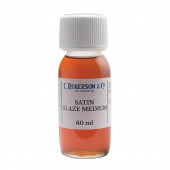
Roberson Satin Glaze Medium
Starting at: £9.80
Mix with tube oil colours or pigment to improve flow and translucency. For thin glazes, fine details and smooth brushwork. Learn More -
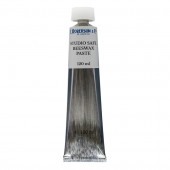
Roberson Studio Safe Beeswax Medium
Starting at: £18.60
A safe wax medium for impasto effects. This medium retains palette knife marks and brush strokes, remains thick and doubles paint easily, drying to a matt finish.
Studio Safe products are non-aromatic, non-flammable, and have a pleasant orange smell.
Learn More -
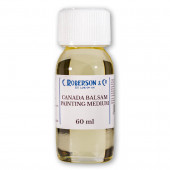
Roberson Canada Balsam Medium
Starting at: £39.10
A high quality painting medium which will produce a deep glow, made from Canada Balsam and Turpentine. Especially effective with transparent oil colours, it is recommended as the medium of choice in the final stages of an oil painting. Learn More -
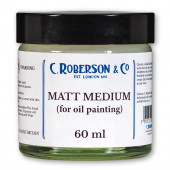
Roberson Matt Medium
Starting at: £13.50
Roberson's Matt Medium creates a dead-flat finish when mixed with oil colour. It aids the flow and increases the artist's control of oil paint, allowing for smooth application flat brush marks with low edges. It can be mixed with oil paint in any ratio. Learn More -
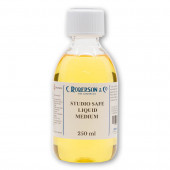
Studio Safe Liquid Medium
Starting at: £17.10
Studio Safe Liquid Medium is a mix of Studio Safe Solvent and natural artists' oils. It is used to thin paint and increase gloss. This product is non-aromatic, non-flammable and has an orange scent. Learn More -
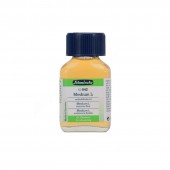
Schmincke Medium L 180ml
£15.00Schmincke Medium L is a jelly-like medium for “soft” painting with oil colours. It improves flow and reduces brush strokes, accelerates drying, increases gloss and transparency. There is no change of the product quality based on the colour change of the raw material alkyd resin. Shake well and stir – if necessary – before use. Close immediately after use.
Contains: alkyd resin, mineral spirit, siccative.
Dosage:10% to 20% maximum.
Thinner: Turpentine substitute
Learn More -
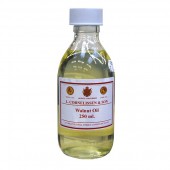
Cornelissen Walnut Oil
Starting at: £8.20
The introduction of Walnut Oil as a pigment binder is contemporaneous with the emergence of Linseed Oil. Their drying properties have been appreciated since the Middle Ages, and throughout history there is evidence of both oils being used alongside each other within the same painting. In fact, until the sixteenth century, it is believed that Walnut Oil was the preferred binding medium among Italian artists. It is made from mature walnut kernals, offering a pale colour and brilliant gloss. For this reason, it is sometimes chosen as a binder for light colours, as it provides a stronger paint film than Poppy Oil, and faster drying times. However, a paint film made from Walnut Oil will tend to be brittle, so it is more suited to a rigid support rather than canvas.
Learn More -
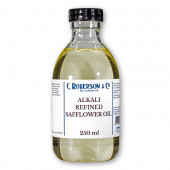
Roberson Safflower Oil
Starting at: £7.70
Safflower Oil is light-coloured, making it suitable for grinding pale pigments. It is still sometimes used as a binder for commercially available paints, although due to its very slow drying time it is best reserved for the final layers of a painting. Compared to Linseed oil, Safflower Oil will give a matte finish.
Learn More -
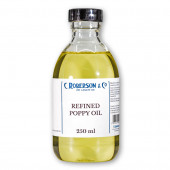
Roberson Poppy Oil
Starting at: £10.20
Poppy Oil is a slightly later addition to the artist's cabinet than Linseed Oil and Walnut Oil. It is generally used as a binder for pale colours, where the warmth of Linseed Oil is not desired. It provides a matte finish and dries very slowly, so we would not advise using it in conjunction with slow-drying pigments or in underpaintings. A paint film produced by Poppy Oil is weaker and softer than that created by Linseed Oil. This is because it contains a smaller percentage of linolenic acid than Linseed Oil; this substance imparts both strength and yellowness to an oil.
Although some of these properties can be perceived as drawbacks, paints made with Poppy Oil generally obtain a "short" or buttery texture without the addition of waxes or other additives, which can be an advantage for certain colours that produce poor consistencies in Linseed oil alone. Sometimes, the addition of a small quantity of Poppy Oil when grinding a tricky or "stringy" pigment in Cold Pressed Linseed Oil can introduce some of benefits of Poppy Oil, without transmitting its negative characteristics.
Paints made with Poppy Oil are particularly suited to "alla prima" working methods, where paint is applied spontaneously. When working in successive layers, Poppy Oil would only be appropriate for the final stages of a painting.
Learn More -
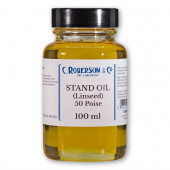
Roberson Linseed Stand Oil
Starting at: £10.50
Linseed Oil is derived from flax seeds, and appears on our shelves in many guises: Cold Pressed, Refined, Stand Oil, and as a key ingredient in many mediums. It has been appreciated for its drying properties since the Medieval period, and has become the most popular oil used in painting today due to the strong, flexible and glossy film that it creates.
Stand Oil is paler and more viscous than other Linseed Oils, having been heated and kept at temperature to provoke a molecular change. It is not suitable for grinding colours, but it is a very versatile ingredient that can be thinned with turpentine to create a glazing medium or be included in a varnish. Stand Oil is notable for its ability to smooth out brush strokes to create an enamel-like surface.
Learn More -
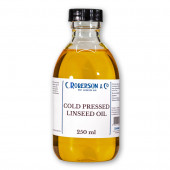
Roberson Cold Pressed Linseed Oil
Starting at: £7.50
Linseed Oil is derived from flax seeds, and appears on our shelves in many guises: Cold Pressed, Refined, Stand Oil, and as a key ingredient in many mediums. It has been appreciated for its drying properties since the Medieval period, and has become the most popular oil used in painting today due to the strong, flexible and glossy film that it creates. Cold Pressed Linseed Oil is ideal for the grinding of pigment to make oil paints. The process of producing Cold Pressed Linseed Oil results in a lower yield, but the resultant oil is of a superior quality to oil that has been extracted by other methods, creating a paint film that is more resistant to embrittlement on aging. Its yellow colour is caused by the high concentration of linolenic acid, the presence of which provides durability to the paint film. The amount of oil that each pigment requires can vary enormously. Alizarin Crimson, for example, requires a high percentage of oil compared to most other colours. We would always recommend mulling the pigment and oil together thoroughly to create a "short" or buttery paste, with evenly dispersed, well-coated pigment particles. This process contributes to the strength and flexibility of the paint film, and prevents the inclusion of excess oil. Origin: USA Learn More -
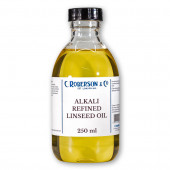
Roberson Refined Linseed Oil
Starting at: £13.30
Call to Order
Linseed Oil is derived from flax seeds, and appears on our shelves in many guises: Cold Pressed, Refined, Stand Oil, and as a key ingredient in many mediums. It has been appreciated for its drying properties since the Medieval period, and has become the most popular oil used in painting today due to the strong, flexible and glossy film that it creates.
Alkali Refined Linseed Oil has been treated to reduce its acidity, and is a useful ingredient in mediums and varnishes.
Learn More -
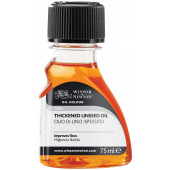
Winsor & Newton Thickened Linseed Oil
Starting at: £9.20
From the Winsor & Newton website: A pale refined oil of syrupy consistency which behaves like Linseed Stand Oil but dries quicker and darker. Improves flow and gloss. Increases the durability of paint film. Reduces brushstroke retention. Learn More -
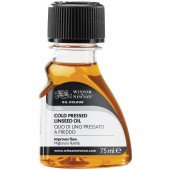
Winsor & Newton Cold Pressed Linseed Oil
Starting at: £9.20
From the Winsor & Newton website: A slightly yellow oil, which is extracted without the use of heat dries slightly quicker than refined linseed oil. Improves flow. Increases gloss & transparency. Reduces consistency and brushstrokes. Ideal for grinding pigments. Learn More -
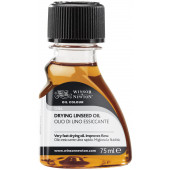
Winsor & Newton Drying Linseed Oil
Starting at: £9.20
From the Winsor & Newton website: Darker than refined Linseed Oil, this oil promotes the fastest drying rate of all the oils, whilst increasing gloss. Improves flow. Increases gloss transparency. Add to other oils to speed drying.
Learn More -
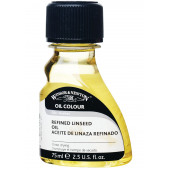
Winsor & Newton Refined Linseed Oil
Starting at: £6.85
From the Winsor & Newton website: Our most popular oil. A low viscosity alkali refined oil of pale colour that dries slowly. Reduces oil colour consistency. Increases gloss and transparency. Add to other oils to slow drying. Learn More -
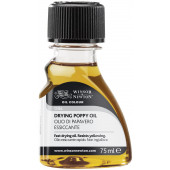
Winsor & Newton Drying Poppy Oil
Starting at: £9.20
From the Winsor & Newton website: A fast-drying, pale oil made from poppy seeds which is well suited for whites and pale colours. Reduces consistency. Increases gloss & transparency. Resists yellowing.
Learn More -
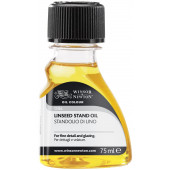
Winsor & Newton Stand Linseed Oil
Starting at: £9.20
From the Winsor & Newton website: A pale viscous oil that slows drying while imparting a tough, smooth enamel finish with no brush marks. Increases film durability. Ideal for glazing and fine detail if mixed with solvent.
Learn More -
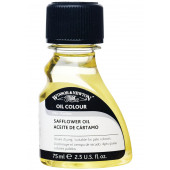
Winsor & Newton Safflower Oil 75 ml
£9.20From the Winsor & Newton website: A slow drying oil which improves flow, increases gloss and transparency. Particularly suitable for use with whites and pale colours.
Learn More -
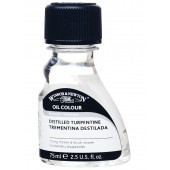
Winsor & Newton Distilled Turpentine
Starting at: £6.85
From the Winsor & Newton website: A fast evaporating, highly refined essential oil with the strongest thinning and brush cleaning power of all Artists' grade solvents. Suitable for removing varnish (including Dammar Varnish).Keep tightly closed and away from light to prevent oxidation. Do not use if it has thickened. Learn More -
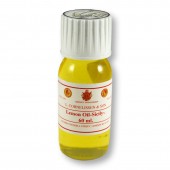
Cornelissen Lemon Oil
Starting at: £12.30
Lemon oil is an essential oil, primarily used for its scent. Learn More -
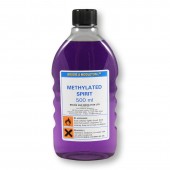
-
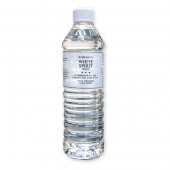
Roberson White Spirit
Starting at: £7.50
Plastic container. Solvent distilled from crude petroleum oils. Used to thin colour and to clean brushes. Slower drying time than turpentine. Learn More -
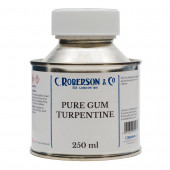
Roberson Pure Gum Turpentine
Starting at: £14.00
Slightly less refined than rectified spirit of turpentine. Often preferred as constituent of painting mediums. Learn More -
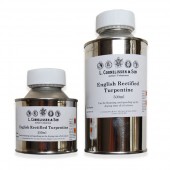
Cornelissen Rectified Turpentine
Starting at: £9.00
Volatile colourless liquid distilled from pine sap. Greater wetting powers than white spirit. Used to thin oil paint. Learn More -
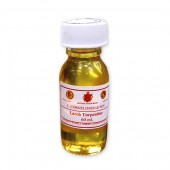
Cornelissen Larch Venice Turpentine
Starting at: £28.80
Venice Trupentine is a thick, resinous liquid extracted from the Larix decidua, a larch tree native to Austria. It can impart luminosity, brilliance and gloss when used in mediums and varnishes, and as such it was highly valued during the Golden Age of painting in Venice. It is a slow-drying balsam, which can be diluted with turpentine or placed in a bath of warm water to aid flow.
Learn More -
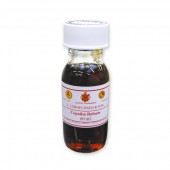
Cornelissen Copaiba Balsam
Starting at: £20.80
Copaiba Balsam comes from the South American tree Copaifera landsdorfii. Its primary function is to improve the appearance of paint layers that may have become dull, brittle or sunken upon drying. It is a viscous liquid that may be diluted with turpentine, but which should not be used in painting mediums.
Learn More -
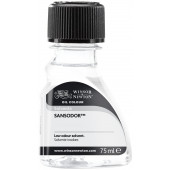
Winsor & Newton Sansodor
Starting at: £6.85
Sansodor is a low-odour solvent which can be used as an alternative to turpentine. It evaporates slowly, increasing the blending time of oil paints, and can be used to clean brushes. Learn More -
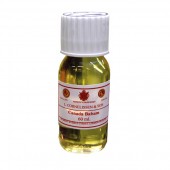
Cornelissen Canada Balsam
Starting at: £39.10
Canada Balsam is an oleoresin, meaning that it is a mixture of essential oils and resin. It comes from the fir tree Abies balsamea, native to Canada and the eastern states of North America. It is notable for its pale colour, clarity and gloss, making it a useful ingredient in recipes for oil-painting mediums.
Learn More -
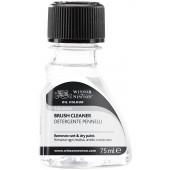
Winsor & Newton Brush Cleaner
Starting at: £4.80
From the Winsor & Newton website: A new addition to the Winsor & Newton range, this water-miscible solvent removes dried oil, alkyd acrylic colour from brushes. Soak in the cleaner overnight scrub if necessary. Cleanable with water.
Learn More





